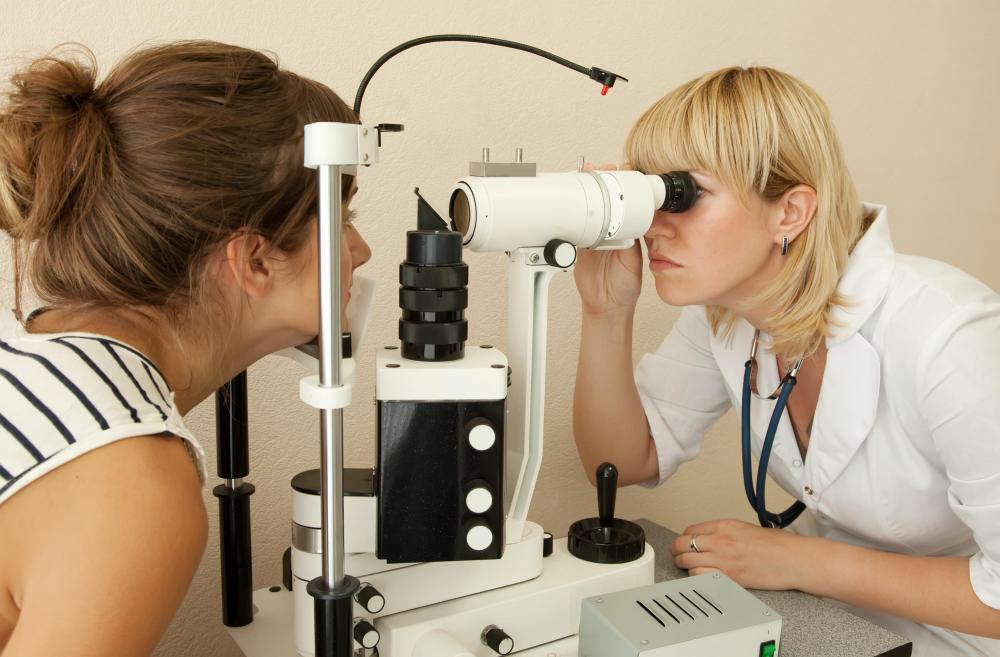At WiseGEEK, we're committed to delivering accurate, trustworthy information. Our expert-authored content is rigorously fact-checked and sourced from credible authorities. Discover how we uphold the highest standards in providing you with reliable knowledge.
What are the Different Myopia Causes?
Myopia, otherwise known as nearsightedness, is when a person has difficulty seeing objects at a distance, due to having a longer eyeball or a more curved cornea. There are several myopia causes, the two most common are heredity and environmental factors. More rare myopia causes are other eye disorders such as keratoconus or cataracts, sudden development of nearsightedness due to other illness like diabetes or continued growth of the back of the eyeball in adulthood, called pathological myopia.
Myopia is the result of light and images not focusing properly as they enter the eye, instead of focusing on the retina where they belong, they focus in front of it. This can be caused by the shape of the cornea, or the lens in front of the eye having too much curve, directing the light to the incorrect spot. It can also happen when the shape of a person's eyeball is longer than normal, causing the retina to be further back than it should be. In both cases, the light is focused in front of the retina instead of on it, resulting in blurred images.

The most common of the myopia causes is heredity. Nearsightedness is most often diagnosed in childhood, during the school age years. Children of parents who have myopia — and particularly those from parents who are nearsighted — are much more likely to develop it. The percentage of myopic children with no family history of the problem is extremely low.

Often in conjunction with heredity, another of the myopia causes is environmental factors related to how the eyes are often used. There is quite a bit of evidence that shows that people who spend a lot of time on activities that require the eyes to focus on close objects, such as reading or computer use, are more likely to develop myopia. It is thought that long periods of time focusing close-up can actually cause subtle changes in the eyeball's shape that become permanent over time. This could account for the fact that myopia most often develops once a child begins formal education and these activities become more common.

The other myopia causes are far less common. One of them is called pathological myopia, which means the back of the eyeball lengthens after reaching a normal adult size causing rapid, progressively worsening, vision changes that could eventually result in blindness. Another myopia cause is when the vision changes are caused by a separate condition such as uncontrolled diabetes or certain nervous system disorders. This is called psuedomyopia and often improves once the condition causing it is treated.

Secondary myopia is when myopia results from other conditions that affect the eyes. It can be caused by other eye disorders like cataracts, or a condition called keratoconus where the cornea gradually changes shape. It can also be caused as a result of premature birth. Depending on the cause secondary myopia can improve or can remain permanently.
AS FEATURED ON:
AS FEATURED ON:
















Discussion Comments
@irontoenail - I think a lot of people these days don't wear glasses at all and instead stick to contact lenses. I know my mother ended up being both shortsighted and longsighted when she finally went in to check her sight (which, to be honest, had been going downhill for a while) and she was very disappointed that you can't get progressive contacts that will deal with both of those. So she ended up having to get glasses instead and she's one of the only people at her work who wears them.
I always have to remind her to bring them with her because she's always forgetting them. But I guess this could be because she ended up with degenerative myopia instead of having it all her life and getting used to the glasses over time.
@clintflint - I don't know if people really get teased just for having glasses. I can remember when my best friend got glasses when I was still in grade school I was completely jealous of her because I thought they looked cool. Jealous to the point where my parents ended up having to put me in for testing as well, because I kept complaining about needing glasses (even though my eyesight was fine at that point). If one of the causes of myopia was wanting to have it, I would have gotten it.
I can still remember the first time I put on glasses that were designed for me, when I was a little girl. I've always had one eye much more strongly myopic than the other and so I never got to wear a family member's prescription and see more clearly, because my prescription was just too unique.
When I put on my own glasses suddenly I could see so much detail in the world. It was like being given super powers.
I've experienced it again when my eyes got worse but it wasn't quite as overwhelming as that first time. It definitely helped me to get to the point where I wasn't embarrassed to wear my glasses in class.
Post your comments